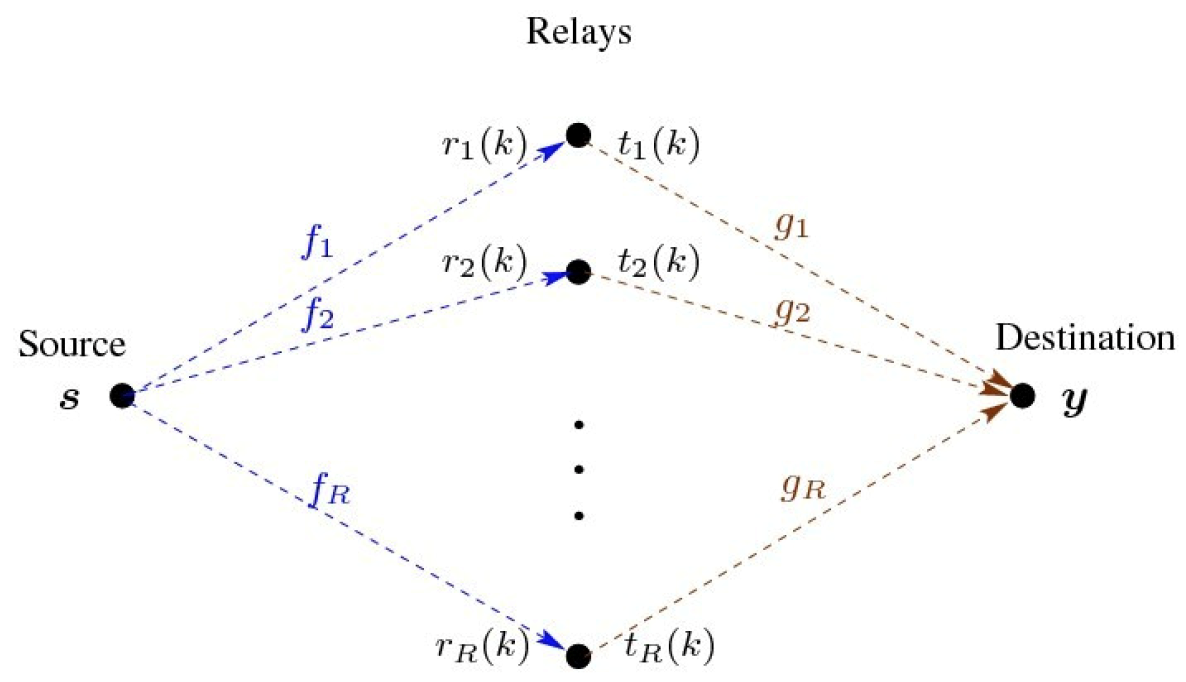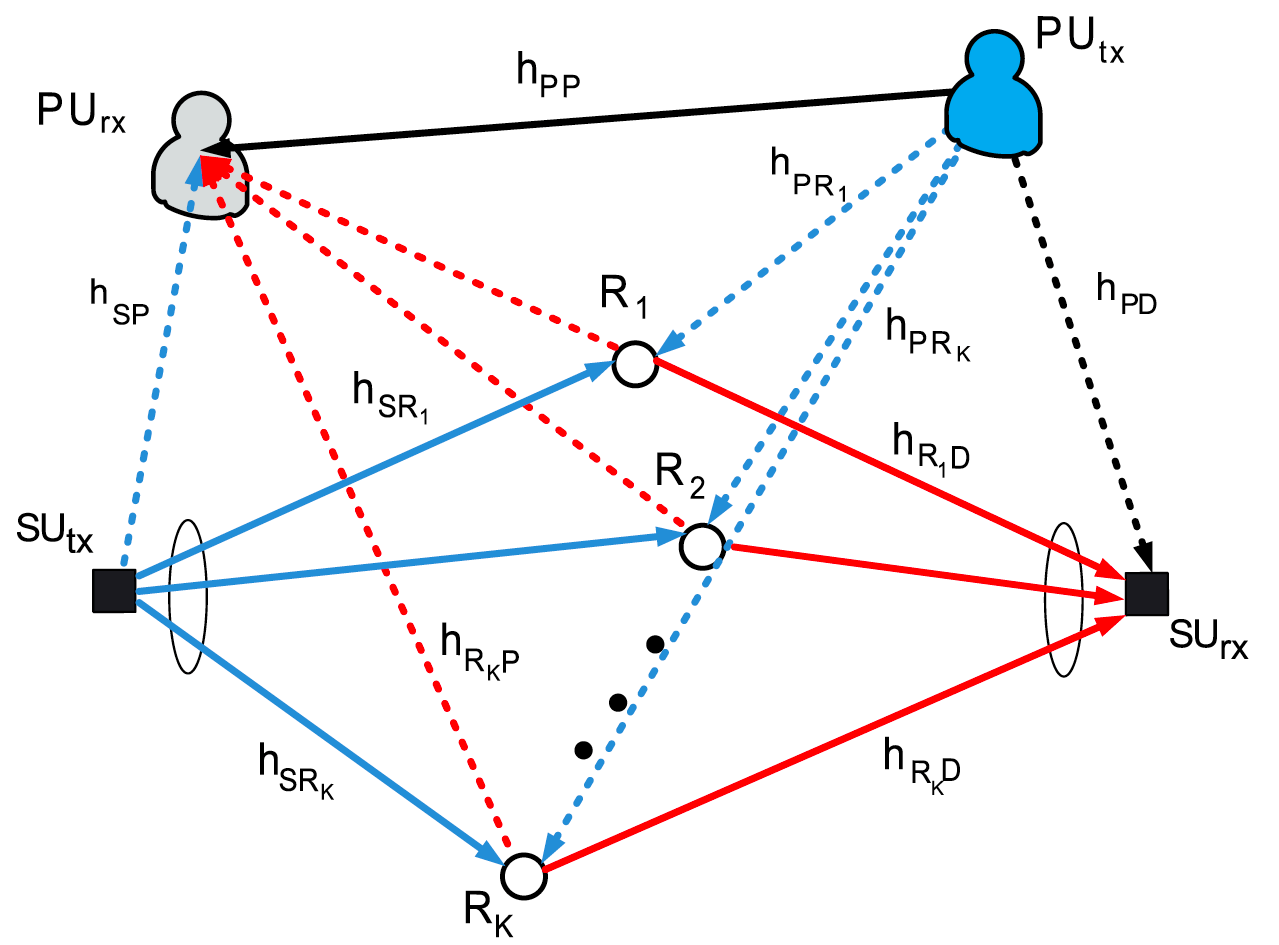A. Wireless Sensor Networks
Wireless sensor networks provide exceptional opportunities for monitoring and controlling homes, cities, and the environment. Thanks to the recent advances in microelectronics, micro-mechanics, and wireless communications, it is now possible to deploy multi-functional, low cost, low power consumption, and small size smart devices.
A.1. Our Research :
Our research has mainly focused on cooperative multi-hop relay networks employing distributed space-time block coding (DSTBC) at the relay nodes. More specifically, we have considered the issue of channel estimation when coherent detection is used in order to improve link performance and data rate. There, we have worked on pilot-based and semi-blind channel estimation to acquire the channel state information (CSI) at the destination for the case of amplify-and-forward signaling at the relays. The motivation behind semi-blind estimation is the need to minimize the number of pilots in order to reduce power consumption at the source and the relays, which is among the critical issues in sensor networks.
A.2. Main Contributions :
We have shown that for the case of orthogonal DSTBCs at the relays, partial CSI knowledge is practically sufficient for optimal signal detection. When a non-orthogonal DSTBC is employed, however, the performance difference between the two cases of full CSI and partial CSI knowledge becomes more considerable. Nevertheless, the performance degradation due to the use of partial CSI remains acceptable, given the increased network complexity to acquire the full CSI [1].
We also considered semi-blind channel estimation based on the expectation maximization algorithm. The resulting performance improvement is more significant for a larger number of relays, where we can benefit from more distributed diversity and the contribution of the detected data symbols to channel estimation becomes more beneficial [2].
As an alternative to semi-blind channel estimation, and based on a Bayesian approach, we also proposed to modify the signal detection at the destination node in order to take into account the imperfect channel estimation. We showed that this solution allows a significant performance improvement ; in particular, for non-constant modulus signal constellations of relatively large size ; as well as for relatively low pilot powers [3].
B. Cognitive Radio
Cognitive radio (CR) has attracted a great attention in RF systems in order to alleviate inefficient utilization of scarce spectrum resources. We have been considering the so-called underlay CR approach, where cognitive users are allowed to share the frequency band allocated to a primary user (PU) as long as no harmful interference is imposed on it. Here, Here, we should take into account two fundamental aspects : the low transmit power of secondary users (SUs) and the imposed interference from PU signal transmission.
A.1. Our Research :
We have proposed to exploit the potential of relay networks in reducing the overall path loss in a CR transmission scenario with the aim of lowering the interference from the secondary network to the PU. We focused particularly on channel estimation in such a network. In fact, in addition to the classical additive noise, the interference imposed from PU signal transmission degrades the accuracy of channel estimates.
B.1. Main contributions :
We investigated how to adjust the amplify-and-forward relay amplification factors by taking into account the interference temperature constraint at the PU receiver. Also, for the case of maximum a posteriori signal detection at the destination, we proposed a modified detector formulation to reduce the impact of channel uncertainty on the receiver performance by appropriately exploiting the statistics of the channel estimation errors [4].
Selected publications :
[1] Y. Zhang, M. A. Khalighi, S. Bourennane, “Iterative channel estimation and data detection for amplify-and-forward relay networks,” IEEE Communications Letters, vol. 16, no. 5, pp. 710–713, May 2011.
[2] Y. Zhang, M. A. Khalighi, S.M.S. Sadough, and S. Bourennane, “Semi-blind channel estimation for amplify-and-forward cooperative relay networks,” Mediterranean Journal of Computers and Networks, Special Issue on Wireless Networks, vol. 10, no. 1, pp. 212–222, Jan. 2014.
[3] Y. Zhang, M.A. Khalighi, S. M. S. Sadough, S. Bourennane, “Improved MAP Signal Detection for Amplify-and-Forward Relay Networks with Imperfect Channel State Information,” IET Communications, vol. 8, no. 16, pp. 2900–2908, Nov. 2014.
[4] S.M.S. Sadough, Z. Chamideh, M. A. Khalighi, "Efficient signal detection for cognitive radio relay networks under imperfect channel estimation," Transactions on Emerging Telecommunications Technologies, vol. 27, no. 11, Nov. 2016, pp. 1593-1605.
Contact : Ali Khalighi




 ResearchGate
ResearchGate Flux RSS
Flux RSS